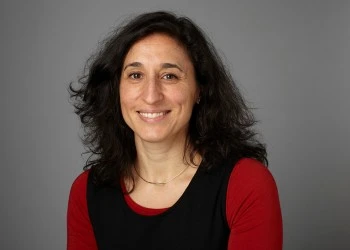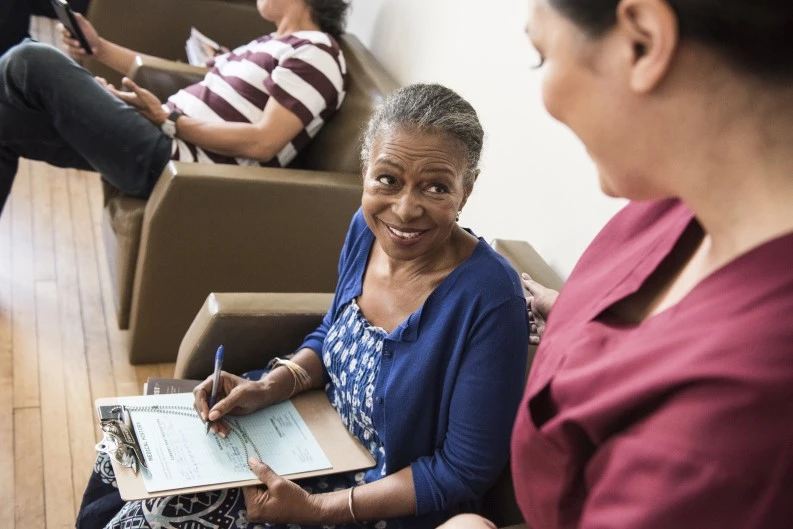For Pierre-Alexis Ruffié, managing clinical trials at Novartis is personal. “I don’t usually share this, but I was a cancer patient when I was younger. I had surgery and chemotherapy, so I know how it feels to be on the other side,” says Ruffié, who serves as Associate Global Trial Director in Oncology at Novartis. “You’re always wondering, ‘What are they going to find? Is it going to be worse?’ My own experience makes me pay close attention to the feelings and experiences of the people participating in our trials.”

Respecting and understanding the patient perspective is a core pillar of The Novartis Commitment to Patients and Caregivers, which outlines our ambition to embrace the perspective of patients and caregivers more firmly and embed it deeply in our daily work. As part of an overall effort to increase awareness around key issues for the lung cancer community, Novartis is working with advocacy organizations worldwide to amplify the voices of patients and advocates; to turn the sound up on lung cancer, a disease that despite its impact is often not as visible as other cancers. One area Novartis has long been focused on is hearing what patients have to say about clinical research. And the insights shared by patients have been applied to the research and development of Novartis lung cancer treatments.
“It’s always in our heads, ‘How is this going to impact the patient?’” says Pilar Cazorla-Arratia, a Global Trial Director at Novartis. According to Cazorla-Arratia, this means scrutinizing every process in a clinical trial protocol to recognize what it means for patients and how it might impact them. “We’re developing medicines for patients, and it is imperative we listen to their needs and preferences,” she says.

When it comes to lung cancer – a very frightening diagnosis for a patient – bringing forward new therapies that can improve and extend people’s lives is an urgent priority. Understanding the realities of clinical trial participation and how to more easily fit treatment into everyday life—addressing everything from the frequency of visits and unexpected side effects to the impact of cultural differences—are key steps to deliver better outcomes.
Engaging with patients through GOPIPs
Novartis is expanding its involvement with patients involved in clinical trial research through its Global Oncology Patient Insights Panels (GOPIPs). These panels are made up of patient advocates and experts in different disease areas. They provide feedback on research and development projects and other patient support initiatives. The current lung cancer GOPIP includes members of six advocacy groups from around the world. They share patient insights from their networks and help identify people with the experience and expertise to address critical issues and questions.

“Direct patient advocate engagement is helping us keep patients at the center of our decisions in more ways than ever before,” says Susan Hayes, who led recent GOPIP lung cancer advocacy initiatives and serves currently as Global Patient Engagement Director for melanoma and gastrointestinal cancers. Through the GOPIPs, Novartis hears directly from advocates on topics ranging from clinical trial protocols and educational resources, to how patients would prefer to receive their treatment. “Now we know that we’re designing the trial, and the drug, with the patient in the forefront,” she says, adding that bringing advocates in earlier rather than later allows for necessary study protocol modifications, which can be key to efficient drug discovery and regulatory review.
The insights gathered from GOPIP projects have also led to a better understanding of patient challenges, including requirements that make it difficult for them to enroll in trials, and the number, frequency and invasiveness of some tests, scans and other required monitoring. “We’re not the only biopharmaceutical company bringing patients into trials early, but Novartis does it in a very robust and sustained way,” Hayes says.
Between 2018 and 2020, Novartis more than doubled the number of GOPIP-supported projects across Oncology, increasing from 29 projects in 2019 to an expected 72 by the end of 2020. These panels directly helped Novartis lung cancer research programs, including the introduction of a new targeted therapy for non-small cell lung cancer, Tabrecta® (capmatinib), and an ongoing investigation involving canakinumab (ACZ885).
The lung cancer GOPIP is one of the panels brought in earliest of all Novartis trials. Their early input on the CANOPY program contributed to the launch of three Phase III trials that are currently ongoing in centers around the world.
Susan Hayes, Global Director, Patient Engagement, Novartis Oncology
Learnings in lung cancer
In 2017, researchers were studying canakinumab as a potential new agent to reduce cardiovascular risk when they observed reductions in lung cancer mortality. These findings led Novartis to launch the Phase III CANOPY clinical trial program in non-small cell lung cancer. The CANOPY trials were designed to test a new approach to immunotherapy by reducing a specific type of inflammation that researchers believe promotes lung cancer growth. Given the shift in research focus to lung cancer patients, who may have different needs and experiences compared to people with heart disease, collaborating with the lung cancer community was critical. “The lung cancer GOPIP is one of the patient panels brought in earliest of all Novartis trials. Their early input on the CANOPY program contributed to the launch of three Phase III trials that are currently ongoing in centers around the world,” Hayes says.
Ruffié helped develop the protocol and informed consent process for the neoadjuvant CANOPY trial. He says the GOPIP shed light on the need to balance the patient point of view on data collection points, like the number of required visits and scans, with researchers’ need to collect enough data to carefully evaluate the efficacy of the new treatment. The lung cancer GOPIP also reinforced the importance of capturing patient insights across different countries. “While we’re developing a global research template, it’s also important to have feedback from each country where you intend to develop the drug,” he says. “The way we interact with patients can be very different from one country to another.”
One of the more alarming findings that was reinforced by conversations with advocates during the lung cancer patient insight panels was the extent to which the public stigma of lung cancer impacts patients’ expectations, often making them question if they “deserve” the cancer, and if they are worthy of treatment or social support. “A lot of people think that if you have lung cancer, you're a smoker, you're responsible for getting it, which is not true,” says Cazorla-Arratia. “There are many types of lung cancer that have nothing to do with being a smoker.”
These types of insights are helping researchers and medical personnel make better-informed decisions about research and treatment options. They're also helping to drive home the fact that there is more work to be done. When asked what the greatest needs are in lung cancer today, Susan Hayes doesn’t hesitate: more research, more routine screening, and combating the stigma associated with the disease.
Between 2018 and 2020, Novartis more than doubled the number of GOPIP-supported projects across Oncology, increasing from 29 projects in 2019 to an expected 72 by the end of 2020.
It’s never been more important to empower and amplify the voices of lung cancer patients, and the Novartis GOPIPs are playing a vital role in promoting advances for people living with the disease. “The drug development process doesn’t happen in isolation,” says Hayes. “It happens hand-in-hand with patients and advocates, and their insights and feedback impact every aspect of what we do.”
Learn more about the impact and burden of lung cancer (PDF 0.9 MB)
Novartis is giving patients and advocates a critical voice in advancing #lungcancer trials.



